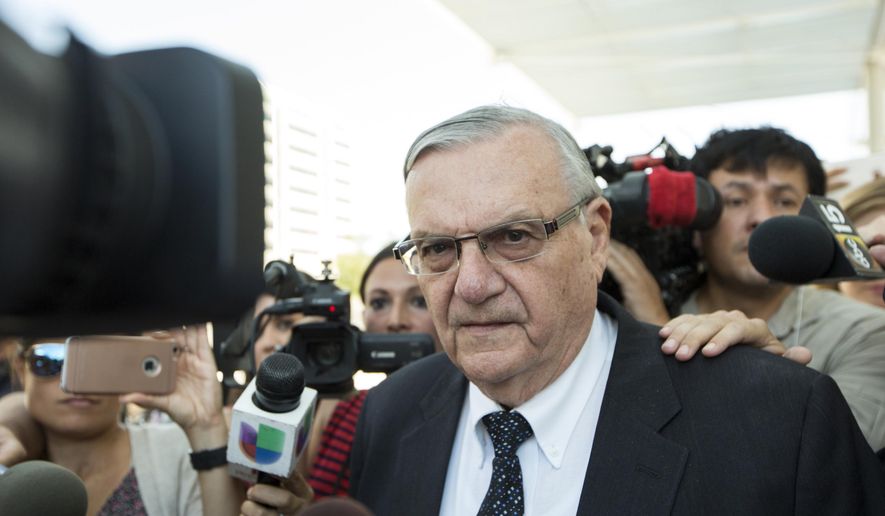The federal judge handling former Sheriff Joe Arpaio’s case signaled Thursday she’s not inclined to erase his conviction from his record — though she did seem inclined to accept the pardon President Trump gave.
In an order, U.S. District Judge Susan Bolton said under Supreme Court precedent and cases in the 9th U.S. Circuit Court of Appeals, which governs her Arizona courtroom, a pardon is a forgiveness of a crime, not an expungement of guilt.
She demanded the Justice Department, which has backed Mr. Arpaio’s request to have his conviction erased, file addition briefs justifying its position.
“U.S. Supreme Court and Ninth Circuit case law suggest that a presidential pardon leaves intact the recipient’s underlying record of conviction,” she wrote.
She convicted Mr. Arpaio in July of contempt of court, finding he willfully ignored another judge’s order to cease a traffic-stop program that netted illegal immigrants who were then turned over to federal officers for deportation.
The former sheriff had filed briefs asking her to throw out the conviction or at least grant a jury trial to rehear the case, and had also said he would appeal — but Mr. Trump delivered a pardon before any of those issues could be heard.
Mr. Arpaio’s legal team says that since the case was never fully argued out, the conviction can’t be considered final and should be erased. They point to a situation where a defendant dies before his appeals are concluded, saying conviction is regularly vacated in those instances.
“Defendant’s acceptance of a pardon absolutely does not acknowledge guilt,” they said in a filing Thursday.
The lawyers said that’s particularly true in a case of contempt of court, where the court itself acts as victim, prosecutor and judge. In those cases, abuse of power is particularly dangerous, the lawyers said, citing the late Justice Antonin Scalia.
“Under these circumstances, a Presidential pardon is the only check on the ’tyranny’ of the judicial branch, as Justice Scalia put it — the only guarantee of the ’rule of law’ by ordinary Americans, of ordinary Americans, and for ordinary Americans,” Mr. Arpaio’s lawyers said. And because they could not speak through a jury, they spoke through their President.”
But a number of anti-Arpaio activists, including some well-known law professors, have filed briefs arguing not only that the conviction must remain, but also urging the judge to refuse to accept the pardon.
They argue that a president can only pardon a violation of a statute passed by Congress, and since this conviction was for contempt of court, a pardon can’t apply.
And even if the judge abides by the pardon, they said, Mr. Arpaio accepted it, so that is an admission of guilt. And they said if the court expunges his conviction, it would send a dangerous message to other future defendants that they can flout the court and perhaps get away with it.
• Stephen Dinan can be reached at sdinan@washingtontimes.com.




Please read our comment policy before commenting.